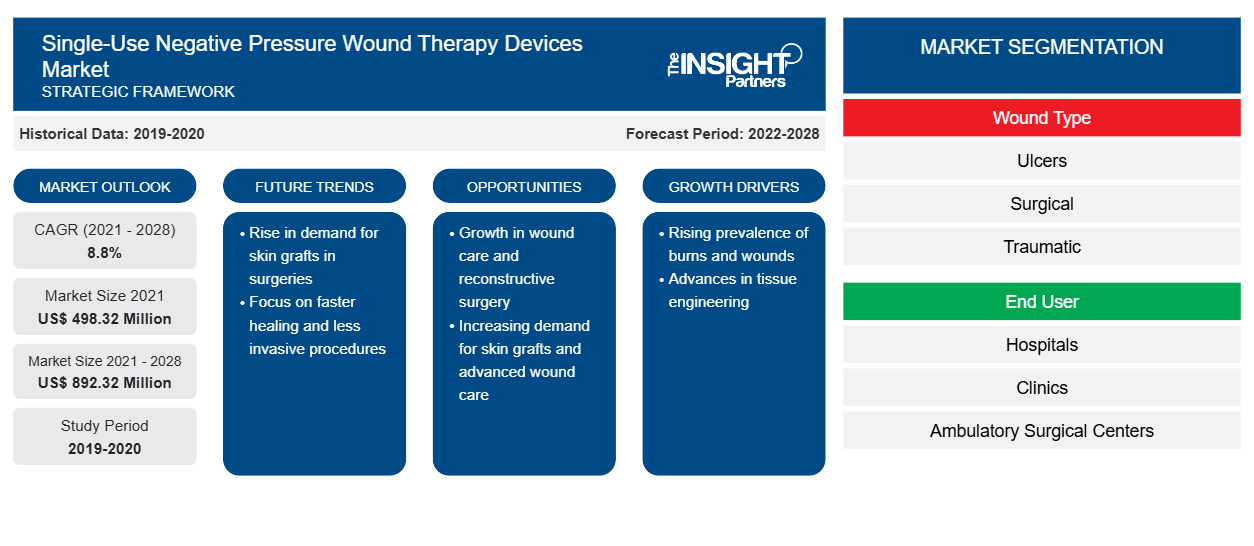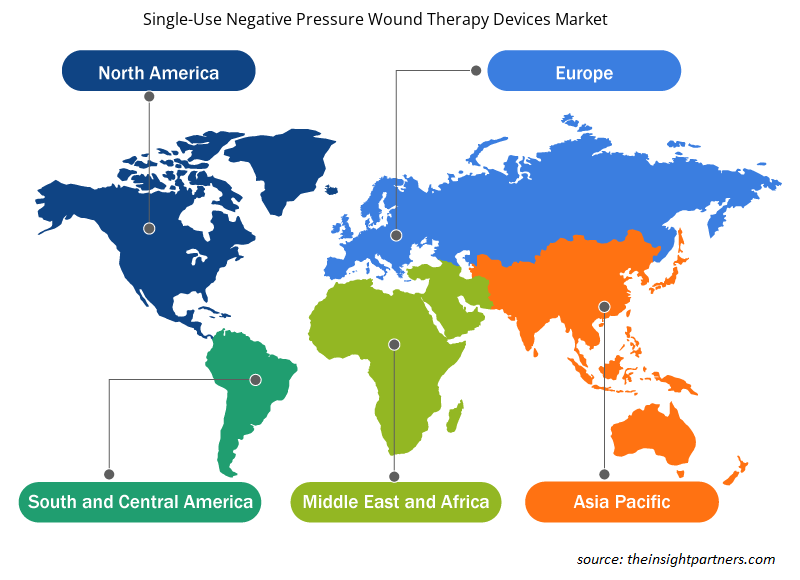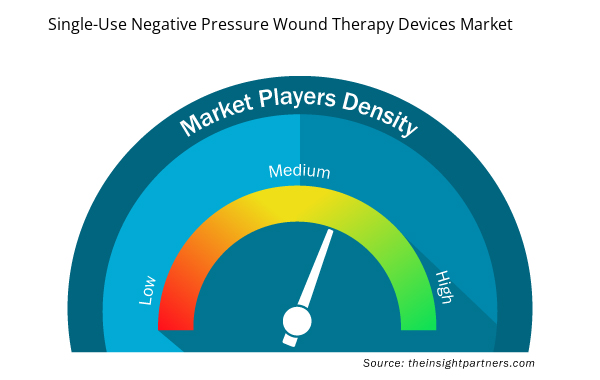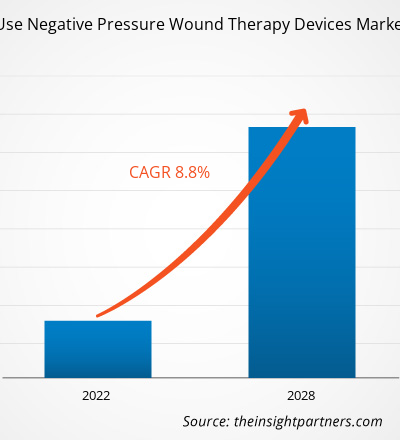Se proyecta que el mercado de dispositivos de terapia de heridas con presión negativa de un solo uso alcance los US$ 892,32 millones para 2028 desde los US$ 498,32 millones en 2021; se espera que registre una CAGR del 8,8% entre 2021 y 2028.
La terapia de presión negativa para heridas (NPWT, por sus siglas en inglés) se utiliza para tratar una amplia variedad de tipos de heridas, incluidas las heridas traumáticas, las de difícil curación y las crónicas. También se utiliza para tratar heridas cubiertas con colgajos o un injerto de piel. Esta terapia se transforma en un dispositivo médico, como un dispositivo NPWT de un solo uso, que es un pequeño dispositivo de bolsillo que funciona con batería. Como sugiere el nombre, se trata de dispositivos desechables y portátiles que se utilizan generalmente para la atención ambulatoria.
El informe ofrece información y un análisis profundo del mercado de dispositivos de terapia de heridas con presión negativa de un solo uso, haciendo hincapié en varios parámetros como las tendencias del mercado, los avances tecnológicos, la dinámica del mercado y el análisis del panorama competitivo de los principales actores del mercado en todo el mundo. También incluye el impacto de la pandemia de COVID-19 en el mercado en todas las regiones. El mercado de dispositivos de terapia de heridas con presión negativa de un solo uso experimentó un déficit al comienzo de la crisis de COVID-19 debido a la interrupción en la cadena de suministro y la caída de la demanda debido al bloqueo anunciado por la mayoría de los países del mundo que causó interrupciones en la fabricación y las operaciones en el sector farmacéutico. Además, los servicios para el cuidado de heridas crónicas se han reducido drásticamente en el primer y segundo trimestre de 2020, pero se han normalizado a fines de 2020. Además, para reducir la contaminación cruzada a través de dispositivos, las personas prefieren los dispositivos desechables. El uso creciente de dispositivos NPWT desechables (de un solo uso) está impulsando su demanda en el mercado global de dispositivos de terapia de heridas con presión negativa de un solo uso. Además, se ha producido una importante reducción de la afluencia de pacientes hospitalizados y ambulatorios en las cadenas de hospitales privados. Para aliviar los sistemas sanitarios, muchas clínicas han pospuesto el diagnóstico y el tratamiento, salvo en los casos de COVID-19. Por ejemplo, en la India, el hospital estatal de Victoria, afiliado al Bangalore Medical College and Research Institute (BMCRI), se convirtió en un centro dedicado a la COVID-19 desde que la pandemia azotó Karnataka en marzo; el funcionamiento de la sala de quemados Mahabodhi del hospital no se ha visto afectado. A pesar de la pandemia, el hospital siguió funcionando con normalidad, siguiendo todas las precauciones contra la COVID-19.
Personalice este informe según sus necesidades
Obtendrá personalización en cualquier informe, sin cargo, incluidas partes de este informe o análisis a nivel de país, paquete de datos de Excel, así como también grandes ofertas y descuentos para empresas emergentes y universidades.
Mercado de dispositivos de presión negativa de un solo uso para el tratamiento de heridas: perspectivas estratégicas

- Obtenga las principales tendencias clave del mercado de este informe.Esta muestra GRATUITA incluirá análisis de datos, desde tendencias del mercado hasta estimaciones y pronósticos.
El tratamiento de heridas crónicas durante la pandemia fue una tarea muy difícil para ambas partes: pacientes y médicos. Para minimizar el riesgo de exposición durante la pandemia, los pacientes utilizaron dispositivos desechables en lugar de los dispositivos NPWT convencionales. Debido a preocupaciones de salud, las personas prefirieron usar productos de un solo uso para tratar heridas crónicas y agudas. Este factor respaldó el crecimiento del mercado durante la situación de pandemia. El mercado de dispositivos de terapia de heridas con presión negativa de un solo uso está segmentado por tipo de herida, usuario final y geografía. El mercado, según la región, está segmentado en América del Norte, Europa, Asia Pacífico, Medio Oriente y África, y América del Sur y Central.
Perspectivas de mercado
Aumento de casos de quemaduras
En 2019, se identificaron un total de 8.378.122 nuevos casos de quemaduras en todo el mundo. Las tasas de mortalidad por quemaduras han ido disminuyendo en muchos países de altos ingresos, pero las muertes infantiles por quemaduras son ahora aproximadamente 7 veces mayores en los países de ingresos bajos y medios que en los países de altos ingresos. El sistema de terapia de heridas con presión negativa de un solo uso se utiliza para tratar heridas agudas y crónicas e incisiones quirúrgicas cerradas con niveles de exudado bajos a moderados. La terapia de heridas con presión negativa (NPWT) implica la aplicación de presión negativa (vacío) a una herida para controlarla y promover la curación. La terapia con presión negativa tópica (TNP), el cierre asistido por vacío (VAC) y la succión de heridas de superficie sellada son otros de los nombres para la NPWT. La NPWT se utiliza para ayudar a drenar el exceso de líquido y mejorar el flujo sanguíneo localizado en pacientes con quemaduras. Se ha sugerido que la acción de la NPWT puede resultar en un mayor suministro de oxígeno y nutrición a la quemadura, lo que promueve la curación. El sistema de terapia de heridas con presión negativa de un solo uso está destinado a personas que se beneficiarían de un dispositivo de succión (terapia de heridas con presión negativa), ya que ayuda a promover la cicatrización de heridas al eliminar cantidades bajas a moderadas de exudado y residuos infecciosos. Las heridas crónicas, agudas, traumáticas, subagudas y dehiscentes; las quemaduras de espesor parcial; las úlceras (como las diabéticas o por presión); los colgajos e injertos; y las incisiones quirúrgicas cerradas son ejemplos de tipos de heridas aceptables.
Además, según el Children's Burn Trust y la British Burn Association, 625 niños son admitidos en un Servicio de Quemaduras del NHS cada mes debido a lesiones por quemaduras o escaldaduras. En 2017, los servicios de quemaduras y escaldaduras del NHS trataron a más de 15.000 pacientes con estas lesiones, con un costo total de más de US$ 24,94 millones (es decir, GBP 20 millones). Más de 40 del total de admisiones por tratamiento de quemaduras en 2017 se clasificaron como extremadamente graves, con procedimientos de tratamiento que costaron más de US$ 118.455,50 (GBP 95.000) por persona. Las quemaduras causadas por accidentes domésticos e industriales están aumentando en regiones en desarrollo como Asia Pacífico, África y Oriente Medio. Por lo tanto, el mercado de dispositivos de cuidado de heridas con presión negativa de un solo uso está siendo impulsado por un aumento en el número de casos de quemaduras y lesiones similares.NHS Burns Service each month owing to burn or scald injuries. In 2017, the NHS's burns and scalds services treated more than 15,000 patients with these injuries, with a total cost of more than US$ 24.94 million (i.e., GBP 20 million). More than 40 of the total burn treatment admissions in 2017 were classified as extremely serious, with treatment procedures costing more than US$ 118,455.50 (GBP 95,000) per person. Burns caused by home and industrial mishaps are rising in developing regions such as Asia Pacific, Africa, and the Middle East. Therefore, the market for single-use negative pressure wound care devices is being driven by an increase in the number of occurrences of burns and similar injuries.
Información basada en el tipo de herida
El mercado mundial de dispositivos de terapia de heridas con presión negativa de un solo uso, según el tipo de herida, se ha segmentado en úlceras, heridas quirúrgicas, heridas traumáticas, heridas deportivas, colgajos e injertos y quemaduras. En 2022, el segmento traumático representó la mayor participación del mercado; además, se espera que continúe su dominio durante el período de pronóstico. Este tipo de herida es la más común debido a la creciente prevalencia de accidentes de tránsito y casos de traumatismos. Además, se espera que el segmento traumático registre la CAGR más alta durante 2021-2028.CAGR during 2021–2028.
Información basada en el usuario final
Según el usuario final, el mercado de dispositivos de terapia de heridas con presión negativa de un solo uso se ha segmentado en hospitales, clínicas, centros quirúrgicos ambulatorios y otros. El segmento de hospitales tuvo la mayor participación del mercado en 2022 y se estima que registrará la CAGR más alta durante el período de pronóstico.CAGR during the forecast period.
Los actores del mercado de dispositivos de terapia de heridas con presión negativa de un solo uso adoptan estrategias orgánicas como el lanzamiento y la expansión de productos para expandir su presencia y cartera de productos en todo el mundo y satisfacer la creciente demanda.
Perspectivas basadas en la geografía
Por geografía, el mercado de dispositivos de terapia de heridas con presión negativa de un solo uso está segmentado en América del Norte (EE. UU., Canadá y México), Europa (Francia, Alemania, Reino Unido, España, Italia y el resto de Europa), Asia Pacífico (China, India, Japón, Australia, Corea del Sur y el resto de APAC), Medio Oriente y África (Arabia Saudita, Emiratos Árabes Unidos, Sudáfrica y el resto de MEA) y América del Sur y Central (Brasil, Argentina y el resto de América del Sur y Central).APAC), the Middle East & Africa (Saudi Arabia, the UAE, South Africa, and the Rest of MEA), and South & Central America (Brazil, Argentina, and the Rest of South & Central America).
Perspectivas regionales del mercado de dispositivos de terapia de heridas con presión negativa de un solo uso
Los analistas de Insight Partners explicaron en detalle las tendencias y los factores regionales que influyen en el mercado de dispositivos de terapia de heridas con presión negativa de un solo uso durante el período de pronóstico. Esta sección también analiza los segmentos y la geografía del mercado de dispositivos de terapia de heridas con presión negativa de un solo uso en América del Norte, Europa, Asia Pacífico, Medio Oriente y África, y América del Sur y Central.

- Obtenga datos regionales específicos para el mercado de dispositivos de terapia de heridas con presión negativa de un solo uso
Alcance del informe de mercado sobre dispositivos de terapia de heridas con presión negativa de un solo uso
| Atributo del informe | Detalles |
|---|---|
| Tamaño del mercado en 2021 | US$ 498,32 millones |
| Tamaño del mercado en 2028 | US$ 892,32 millones |
| CAGR global (2021-2028) | 8,8% |
| Datos históricos | 2019-2020 |
| Período de pronóstico | 2022-2028 |
| Segmentos cubiertos | Por tipo de herida
|
| Regiones y países cubiertos | América del norte
|
| Líderes del mercado y perfiles de empresas clave |
|
Densidad de actores del mercado de dispositivos de terapia de heridas con presión negativa de un solo uso: comprensión de su impacto en la dinámica empresarial
El mercado de dispositivos de terapia de heridas con presión negativa de un solo uso está creciendo rápidamente, impulsado por la creciente demanda de los usuarios finales debido a factores como la evolución de las preferencias de los consumidores, los avances tecnológicos y una mayor conciencia de los beneficios del producto. A medida que aumenta la demanda, las empresas amplían sus ofertas, innovan para satisfacer las necesidades de los consumidores y aprovechan las tendencias emergentes, lo que impulsa aún más el crecimiento del mercado.
La densidad de actores del mercado se refiere a la distribución de las empresas o firmas que operan dentro de un mercado o industria en particular. Indica cuántos competidores (actores del mercado) están presentes en un espacio de mercado determinado en relación con su tamaño o valor total de mercado.
Las principales empresas que operan en el mercado de dispositivos de terapia de heridas con presión negativa de un solo uso son:
- Salud Cardenal Inc.
- Grupo ConvaTec Plc
- Carilex Médico
- Genadyne Biotecnologías, Inc.
- Atención sanitaria H y R
Descargo de responsabilidad : Las empresas enumeradas anteriormente no están clasificadas en ningún orden particular.

- Obtenga una descripción general de los principales actores clave del mercado de dispositivos de terapia de heridas con presión negativa de un solo uso
Perspectivas basadas en la empresa
Cardinal Health Inc; ConvaTec Group Plc; Carilex Medical; Genadyne Biotechnologies, Inc.; H and R Healthcare; Lohmann & Rauscher GmbH & Co. KG; Medela AG; Mölnlycke Health Care AB; Paul Hartmann Ag; y Smith & Nephew plc se encuentran entre las empresas líderes que operan en el mercado de dispositivos de terapia de heridas con presión negativa de un solo uso.
- Análisis histórico (2 años), año base, pronóstico (7 años) con CAGR
- Análisis PEST y FODA
- Tamaño del mercado Valor/volumen: global, regional, nacional
- Industria y panorama competitivo
- Conjunto de datos de Excel


- Europe Industrial Chillers Market
- Dry Eye Products Market
- Medical Collagen Market
- Portable Power Station Market
- Artwork Management Software Market
- Predictive Maintenance Market
- Batter and Breader Premixes Market
- Asset Integrity Management Market
- Water Pipeline Leak Detection System Market
- Constipation Treatment Market

Report Coverage
Revenue forecast, Company Analysis, Industry landscape, Growth factors, and Trends

Segment Covered
This text is related
to segments covered.

Regional Scope
North America, Europe, Asia Pacific, Middle East & Africa, South & Central America

Country Scope
This text is related
to country scope.
Preguntas frecuentes
Global single-use negative pressure wound therapy devices market is segmented by region into North America, Europe, Asia Pacific, Middle East & Africa, and South & Central America. In North America, the U.S. is the largest market for single-use negative pressure wound therapy devices market. The presence of top players and favorable regulations related to product approvals coupled with commercialization of new products are the contributing factors to the regional growth. Additionally, the increasing number of technological advancements, the high adoption rate of devices, and increasing prevalence of wounds are the key factor responsible for the Asia-Pacific regional growth for single-use negative pressure wound therapy devices accounting fastest growth of the region during the coming years.
Cardinal Health Inc; ConvaTec Group Plc; Carilex Medical; Genadyne Biotechnologies, Inc.; H and R Healthcare; Lohmann & Rauscher GmbH & Co. KG; Medela AG; Mölnlycke Health Care AB; Paul Hartmann Ag, and Smith & Nephew plc are among the leading companies operating in the global single-use negative pressure wound therapy devices market
The hospital segment dominated the global single-use negative pressure wound therapy devices market and accounted for the largest revenue of 166.73 million in 2021.
Based on wound type, traumatic segment took the forefront leaders in the worldwide market by accounting largest share in 2022 and is expected to continue to do so till the forecast period.
The increasing prevalence of wounds owing to a surge in trauma, burns, and various conditions such as diabetes and others along with the increase in surgeries are the most significant factors responsible for the overall market growth.
Negative pressure wound therapy (NPWT) is used for managing wide range of wound types such as traumatic, hard-to-heal, and chronic wounds. It is also used to manage wounds that are covered with flaps or a skin graft. This therapy is transformed into a medical device such as a single-use NPWT device, and it is a small pocket-sized battery-operated device. As the name suggests, these are disposable and portable devices generally used for outpatient care.
Trends and growth analysis reports related to Life Sciences : READ MORE..
The List of Companies - Single-Use Negative Pressure Wound Therapy Devices Market
- Cardinal Health Inc
- ConvaTec Group Plc
- Carilex Medical
- Genadyne Biotechnologies, Inc.
- H and R Healthcare
- Lohmann & Rauscher GmbH & Co. KG
- Medela AG
- Mölnlycke Health Care AB
- Paul Hartmann Ag
- Smith & Nephew plc
The Insight Partners performs research in 4 major stages: Data Collection & Secondary Research, Primary Research, Data Analysis and Data Triangulation & Final Review.
- Data Collection and Secondary Research:
As a market research and consulting firm operating from a decade, we have published and advised several client across the globe. First step for any study will start with an assessment of currently available data and insights from existing reports. Further, historical and current market information is collected from Investor Presentations, Annual Reports, SEC Filings, etc., and other information related to company’s performance and market positioning are gathered from Paid Databases (Factiva, Hoovers, and Reuters) and various other publications available in public domain.
Several associations trade associates, technical forums, institutes, societies and organization are accessed to gain technical as well as market related insights through their publications such as research papers, blogs and press releases related to the studies are referred to get cues about the market. Further, white papers, journals, magazines, and other news articles published in last 3 years are scrutinized and analyzed to understand the current market trends.
- Primary Research:
The primarily interview analysis comprise of data obtained from industry participants interview and answers to survey questions gathered by in-house primary team.
For primary research, interviews are conducted with industry experts/CEOs/Marketing Managers/VPs/Subject Matter Experts from both demand and supply side to get a 360-degree view of the market. The primary team conducts several interviews based on the complexity of the markets to understand the various market trends and dynamics which makes research more credible and precise.
A typical research interview fulfils the following functions:
- Provides first-hand information on the market size, market trends, growth trends, competitive landscape, and outlook
- Validates and strengthens in-house secondary research findings
- Develops the analysis team’s expertise and market understanding
Primary research involves email interactions and telephone interviews for each market, category, segment, and sub-segment across geographies. The participants who typically take part in such a process include, but are not limited to:
- Industry participants: VPs, business development managers, market intelligence managers and national sales managers
- Outside experts: Valuation experts, research analysts and key opinion leaders specializing in the electronics and semiconductor industry.
Below is the breakup of our primary respondents by company, designation, and region:

Once we receive the confirmation from primary research sources or primary respondents, we finalize the base year market estimation and forecast the data as per the macroeconomic and microeconomic factors assessed during data collection.
- Data Analysis:
Once data is validated through both secondary as well as primary respondents, we finalize the market estimations by hypothesis formulation and factor analysis at regional and country level.
- Macro-Economic Factor Analysis:
We analyse macroeconomic indicators such the gross domestic product (GDP), increase in the demand for goods and services across industries, technological advancement, regional economic growth, governmental policies, the influence of COVID-19, PEST analysis, and other aspects. This analysis aids in setting benchmarks for various nations/regions and approximating market splits. Additionally, the general trend of the aforementioned components aid in determining the market's development possibilities.
- Country Level Data:
Various factors that are especially aligned to the country are taken into account to determine the market size for a certain area and country, including the presence of vendors, such as headquarters and offices, the country's GDP, demand patterns, and industry growth. To comprehend the market dynamics for the nation, a number of growth variables, inhibitors, application areas, and current market trends are researched. The aforementioned elements aid in determining the country's overall market's growth potential.
- Company Profile:
The “Table of Contents” is formulated by listing and analyzing more than 25 - 30 companies operating in the market ecosystem across geographies. However, we profile only 10 companies as a standard practice in our syndicate reports. These 10 companies comprise leading, emerging, and regional players. Nonetheless, our analysis is not restricted to the 10 listed companies, we also analyze other companies present in the market to develop a holistic view and understand the prevailing trends. The “Company Profiles” section in the report covers key facts, business description, products & services, financial information, SWOT analysis, and key developments. The financial information presented is extracted from the annual reports and official documents of the publicly listed companies. Upon collecting the information for the sections of respective companies, we verify them via various primary sources and then compile the data in respective company profiles. The company level information helps us in deriving the base number as well as in forecasting the market size.
- Developing Base Number:
Aggregation of sales statistics (2020-2022) and macro-economic factor, and other secondary and primary research insights are utilized to arrive at base number and related market shares for 2022. The data gaps are identified in this step and relevant market data is analyzed, collected from paid primary interviews or databases. On finalizing the base year market size, forecasts are developed on the basis of macro-economic, industry and market growth factors and company level analysis.
- Data Triangulation and Final Review:
The market findings and base year market size calculations are validated from supply as well as demand side. Demand side validations are based on macro-economic factor analysis and benchmarks for respective regions and countries. In case of supply side validations, revenues of major companies are estimated (in case not available) based on industry benchmark, approximate number of employees, product portfolio, and primary interviews revenues are gathered. Further revenue from target product/service segment is assessed to avoid overshooting of market statistics. In case of heavy deviations between supply and demand side values, all thes steps are repeated to achieve synchronization.
We follow an iterative model, wherein we share our research findings with Subject Matter Experts (SME’s) and Key Opinion Leaders (KOLs) until consensus view of the market is not formulated – this model negates any drastic deviation in the opinions of experts. Only validated and universally acceptable research findings are quoted in our reports.
We have important check points that we use to validate our research findings – which we call – data triangulation, where we validate the information, we generate from secondary sources with primary interviews and then we re-validate with our internal data bases and Subject matter experts. This comprehensive model enables us to deliver high quality, reliable data in shortest possible time.

 Obtenga una muestra gratuita de este informe
Obtenga una muestra gratuita de este informe